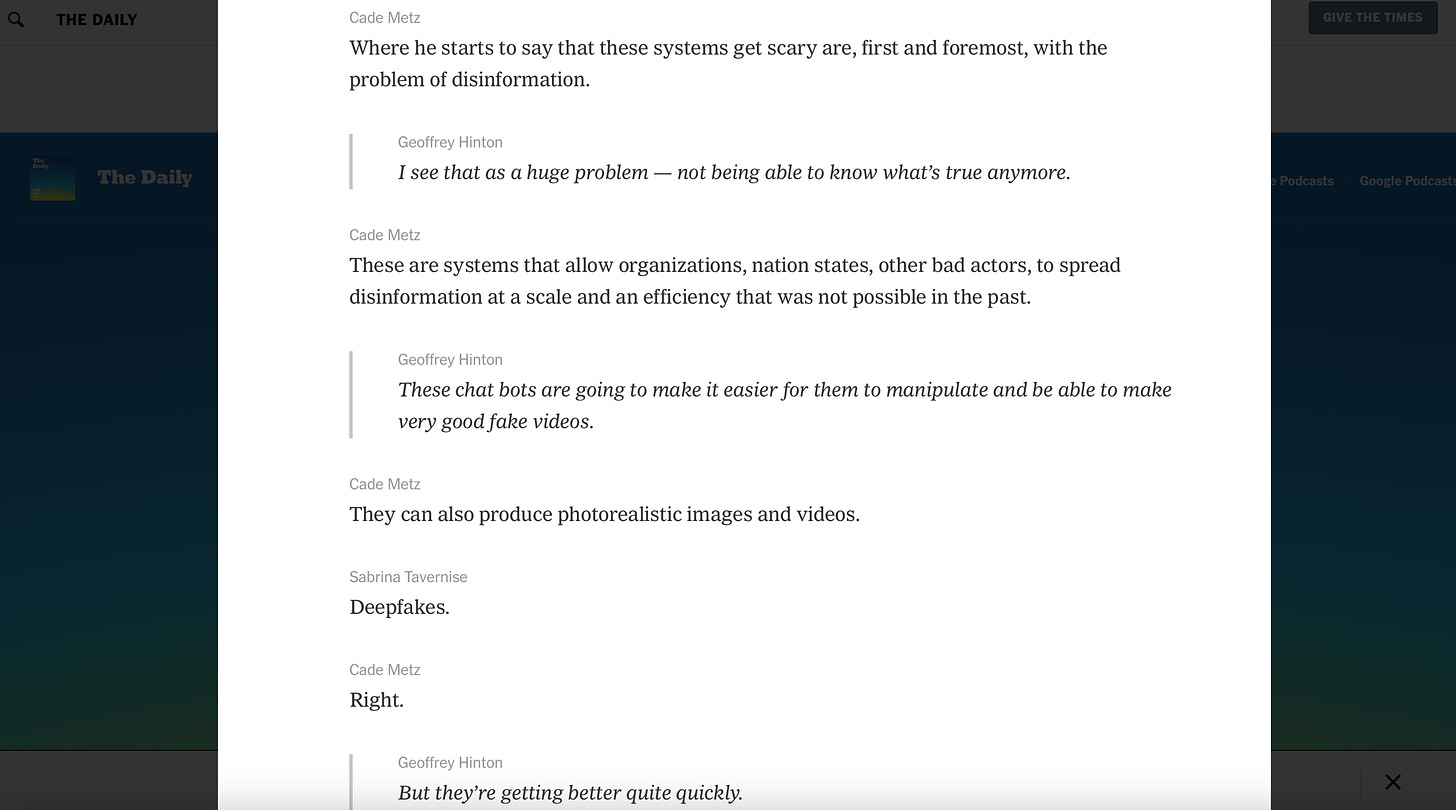Last week on The Daily, technology correspondent Cade Metz spoke with Geoffrey Hinton, the “godfather of A.I.,” who recently quit his job at Google. Hinton has concerns.
sometimes I think my primary interaction with AI has been tiktoks where ChatGPT writes new Gilmore Girls scenes. But to be clear I do support the writers strike. This is irrelevant to my theme. Sorry.
One of the “short-term” and “lesser” worries Hinton describes is “that the internet will soon be flooded with fake text, fake images, and fake videos, to the point where we won’t be able to trust anything we see online.”
This is the kind of thing that piques my interest, of course, because I’m always curious about the ways people think we can come to know anything at all; and Hinton’s concern that deepfakes and disinformation created by AI will mean that we won’t be “able to know what’s true anymore” illuminates his epistemology.
I know what he means, of course, and am attuned to the devastating effects of fake news and disinformation in the hands of bad actors with gullible audiences.
At the same time, though, all I can think is that there are some people who have always had to know how to figure out what was true apart from whatever the apparent legal record was, apart from what pictures made it onto the front page, apart from what the powers rubber-stamped as accurate. There are some people for whom knowing was never about what could be seen, or about what could be proven by pointing to something outside oneself. There are some people whose truth has never been pictured.
And maybe a little part of me thinks it could be good for all of us to have to learn those other ways of knowing, and to live with a healthy skepticism of whatever is being presented by the powers as “truth.” If the spread of AI deepfakes makes us become aware that we should always question what we see and what we’re told, that we should always ask whom the “truth” benefits and whom it harms, then what a gift that could be.
The way compost smells, and crumbles between your fingers, when it’s finished. Where the melody is going to go next. How elastic pizza dough is if you’ve worked it just right. That the cat wants to be scratched on her chin, or that she’s looking for water. The way the air smells when it’s about to snow. That she needs you to hold her hand. Knowing, Ángel Méndez-Montoya says, is a form of savoring. In Spanish, the words are related: “The etymology of both saber (to know) and sabor (to savor) is rooted in the Latin sapio or sapere, meaning to taste, to have a flavor, as well as to understand.”1 Over a lifetime of sweet and bitter, we come to recognize the taste of what is true; we learn to sense the spirit of truth in people.
Writing about the doctrine of the Trinity, a God who is three-in-one, a community of outward-directed love, theologian Elizabeth Johnson says: “relatedness rather than the solitary ego is the heart of all reality.”
Want to know what is true, the heart of reality? It will be begin with relationship, love, community — not with a photo or a video, whether “real” or deepfake.
Three things:
When I think about other ways of knowing, I think about the college professor who first introduced me to Women’s Ways of Knowing. And I think about Alice Walker, whose description of Womanism helped me know in new ways. If you’ve never read In Search of Our Mother’s Gardens, read it!
A Spotify playlist of slow folk covers compiled by me, perfect for very chill summer mornings.
Korean Cheeseburgers with Sesame-Cucumber Pickles: just trust me.
Where Goodness Still Grows is available wherever books are sold. My first book, Dangerous Territory, has a second edition coming out this fall; read more here and contribute to the audiobook campaign!
Ángel F. Méndez-Montoya, The Theology of Food: Eating and the Eucharist (Hoboken: John Wiley & Sons, 2012), 46.





